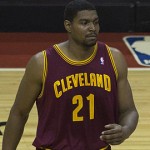 Since training camp opened, there have been five significant trades involving 10 teams, 19 players and seven draft picks.
Since training camp opened, there have been five significant trades involving 10 teams, 19 players and seven draft picks.
The big winners have been a team that got rid of the highest scorer among the traded players and a team that acquired a player who has yet to play. The big loser has been a team that swears by analytics.
Another way to look at it is like this: The biggest trades thus far have been the ones that haven’t been made – Omer Asik for Thaddeus Young, Carmelo Anthony for Blake Griffin, Pau Gasol for just about anybody.
And with six weeks until the trading deadline, there will be plenty more trades that are and aren’t made.
But we can’t grade those. So we graded the ones that have been made.

 1. Wizards acquire Marcin Gortat, Kendall Marshall, Shannon Brown and Malcolm Lee from Suns for Emeka Okafor and a 2014 first-round pick (protected 1-12).
1. Wizards acquire Marcin Gortat, Kendall Marshall, Shannon Brown and Malcolm Lee from Suns for Emeka Okafor and a 2014 first-round pick (protected 1-12).
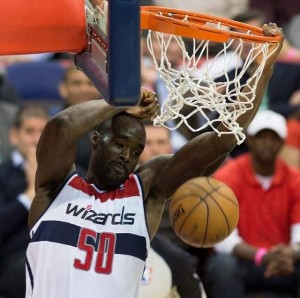
WIZARDS: They probably didn’t think this trade would make a reserve out of Nene, but it did. That has been a smart move, because it allows Washington to go big with Gortat and Nene in tandem or small with just one on the floor. Both help the ball move when it sticks a little bit. Washington had to eat the salaries of Marshall, Brown and Lee, but all had expiring deals anyway. Gortat, 29, is a free agent at the end of the season, and GM Ernie Grunfeld will have to make a decision. Right now, the Wizards are in the playoff picture, which means they would surrender the pick. GRADE: B-MINUS
SUNS: When they made this deal, no one in the organization believed they would be this good. But they got good quickly. Now, Eric Bledsoe’s recovery timetable from knee surgery probably determines their postseason fate. Okafor hasn’t played due to a neck injury but his return hasn’t been ruled out, which means he has value as a player — or as an expiring $14 million deal. Remember, having an expiring eight-figure deal is how Rockets GM Daryl Morey landed James Harden. The pick is one of six first-rounders (including their own) that the Suns have over the next two seasons. GRADE: A-MINUS

 2. Timberwolves acquire Luc Mbah a Moute from Kings for Derrick Williams.
2. Timberwolves acquire Luc Mbah a Moute from Kings for Derrick Williams.
TIMBERWOLVES: GM Flip Saunders obviously felt less was more, because we know what Mbah a Moute is – a solid defender limited at the other end – and no one is really sure what Williams can become. But with Kevin Love entrenched at power forward and Corey Brewer and Chase Budinger sharing small forward, Mbah a Moute’s specialty skill is a better roster fit, even with the extra guaranteed year. His deal expires in 2015 and ultimately will go toward funding Ricky Rubio’s extension. GRADE: C-MINUS
KINGS: Bringing in Williams fits what appears to be GM Pete D’Alessandro’s plan of stockpiling young talent. But that talent has to fit, and Williams has shown that his best position is power forward, where the Kings already had Jason Thompson, Patrick Patterson and the injured Carl Landry, who is the best of the bunch. That forced Williams to play mostly at small forward – at least for a while. In Williams’ defense, he has embraced the new surroundings and is playing much better than he did in Minnesota. And he still has tantalizing talent. GRADE: C

 3. Kings acquire Rudy Gay, Aaron Gray and Quincy Acy from Raptors for John Salmons, Greivis Vasquez, Patrick Patterson and Chuck Hayes.
3. Kings acquire Rudy Gay, Aaron Gray and Quincy Acy from Raptors for John Salmons, Greivis Vasquez, Patrick Patterson and Chuck Hayes.
KINGS: This was a huge gamble by D’Alessandro, because while the acquisition of the 27-year-old Gay fit the team’s new profile, the GM traded a good chunk of his veteran leadership, smarts and 2014 flexibility. Off the court, Gay is due $19.3 million next season but may opt out in search of a long-term deal at a lower annual number, which would help D’Alessandro in trying to retain impending free agent Isaiah Thomas. On the court, Gay has been more efficient than he was in Toronto and gives the Kings a nice foundation with Thomas and DeMarcus Cousins. However, his 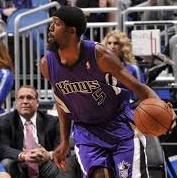 arrival has again marginalized Williams, bumping him to the bench. D’Alessandro’s bigger problem is not being able to move the ordinary Jason Thompson, who is creating a frontcourt logam and has three years and $19 million left on his deal. Gray and Acy aren’t much more than roster filler. They were 5-13 before the trade and 8-9 since but have a boatload of road games left. GRADE: C-PLUS
arrival has again marginalized Williams, bumping him to the bench. D’Alessandro’s bigger problem is not being able to move the ordinary Jason Thompson, who is creating a frontcourt logam and has three years and $19 million left on his deal. Gray and Acy aren’t much more than roster filler. They were 5-13 before the trade and 8-9 since but have a boatload of road games left. GRADE: C-PLUS
RAPTORS: The NBA axiom is the team that got the best player in the trade got the better of the trade, but that may not be the case here. The Raptors gave up Gay’s 19 points per game, but they also gave up his ball-stopping, alpha dog delusions and cap-choking contract while creating more touches for Jonas Valanciunas and more playing time for Terrence Ross, their two best young assets. Among the arrivals, Hayes is the only player GM Masai Ujiri has to pay after this season, because Salmons has a $7 million team option and Patterson and Vasquez have qualifying offers. The trade also gave the Raptors desperately needed depth and veteran smarts. Toronto is 12-5 since the deal – matching Miami for the best record in the East – and Ujiri reportedly has backed off the idea of trading point guard Kyle Lowry. GRADE: A


 4. Grizzlies acquire Courtney Lee and a 2016 second-round pick from Celtics for Jerryd Bayless. Thunder acquire 2014 and 2017 second-round picks from Grizzlies. Celtics acquire Ryan Gomes and cash from Thunder.
4. Grizzlies acquire Courtney Lee and a 2016 second-round pick from Celtics for Jerryd Bayless. Thunder acquire 2014 and 2017 second-round picks from Grizzlies. Celtics acquire Ryan Gomes and cash from Thunder.
GRIZZLIES: Is it panic time in Analyticaland? Conference finalists a year ago, the Grizzlies are 11th in the West and felt like they needed perimeter shooting so badly that they moved an expiring contract and used a $2 million chunk of their Rudy Gay trade exception to acquire Lee, who has two years and $11.1 million left on his deal and does virtually nothing other than shoot. Lee’s arrival doesn’t change the need to go offense-defense at shooting guard down the stretch, while the departure of Bayless also puts pressure on rookie Nick Calathes to effectively back up Mike Conley. (Listen to Sheridan’s story about Calathes). Memphis’ problems are way above Lee’s pay grade. GRADE: D
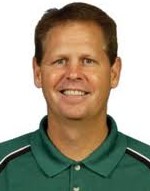
CELTICS: Bayless will play in Boston, at least until Rajon Rondo returns and relegates Jordan Crawford to third guard status, which is actually his ideal role. His arrival spells doom for recent D-League visitor MarShon Brooks and rookie point guard Phil Pressey, who cannot score. And Bayless’ expiring $3.14 million pushes Boston’s potential cap reduction this summer to more than $20 million. Gomes was waived. Celtics GM Danny Ainge deserves a lot of credit for continuing to find takers for the multiple bad contracts on his roster. GRADE: B
THUNDER: They sold this as picking up two draft picks while shedding payroll, but the truth is that the picks disappear unless they fall into a specific five-selection window and they gave the Celtics $1.1 million to take Gomes off their hands. As usual, they are pinching pennies. GRADE: D

 5. Cavaliers acquire Luol Deng from Bulls for Andrew Bynum, a 2014 first-round pick, the right to swap a 2015 first-round pick and 2015 and 2016 second-round picks.
5. Cavaliers acquire Luol Deng from Bulls for Andrew Bynum, a 2014 first-round pick, the right to swap a 2015 first-round pick and 2015 and 2016 second-round picks.
CAVALIERS: The future is now for the Cavs, who burned cap room (Earl Clark) and the top overall pick (Anthony Bennett) but still had a gaping hole at small forward that will be filled by Deng, 28, a legitimate All-Star who becomes their best player. With the 1-2 punch of Deng and Kyrie Irving, capable veterans and young talent, there should be no 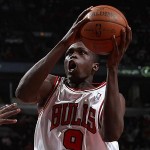 excuse for Cleveland to miss the postseason. But if it does, Deng – a free agent this summer – might find another city more appealing in which to spend his prime. He rejected $30 million over three years from the Bulls. GRADE: B- MINUS
excuse for Cleveland to miss the postseason. But if it does, Deng – a free agent this summer – might find another city more appealing in which to spend his prime. He rejected $30 million over three years from the Bulls. GRADE: B- MINUS
BULLS: Facing their third straight season ending with superstar Derrick Rose in street clothes, Bulls GM Gar Forman decided enough was enough and began looking toward the future. The acquisition and susequent waiving of Bynum will drop the Bulls below the luxury tax threshold. The one year and $16.8 million remaining on Carlos Boozer’s deal now looks more like a trade asset than an amnesty candidate. Mike Dunleavy Jr. is not Deng, but he’s not chopped liver, either; the Bulls are 3-0 since the trade. Chicago has five potential first-round picks over the next two years and still hold the rights to Nikola Mirotic, the best player in Europe. If Rose can return to health, this could be a very quick rebuild. GRADE: B- PLUS
And now for our weekly look around the league, which statistical oddities and much much more. But first …
TRIVIA: Which active player not selected in the first round has the highest career scoring average? Answer below.
I don’t want to be the guy that reads a website regularly and constantly clowns its writers but that guy is coming out today. This is once again surface analysis that I could hear from Colin Cowherd any day. Rudy Gay’s advanced stats look very good when the offense is not run through him, couple that with a team that is looking for a marketable product now (for a new arena in Sac-town) and already has some strong young pieces…the Kings got exactly what they wanted from the trade. Not a C+. I don’t understand how the Wizards get a B- for acquiring three expiring contracts and a starting NBA center and the Suns get a B+ for Okafor’s deal. Bernucca used the win total to appraise this deal when only ONE player in this deal played at all. The Thunder (a legit championship contender in a small market) get a D for swapping a bench fodder for a few draft lottery tickets (rookie contracts are the most coveted)? You are suspect Sheridan Hoops.
Mike,
It’s all good. I hear where you’re coming from on some of this, and Sheridan said I was a tough grader. But it’s also hard to give a grade when you don’t know if some of these guys will be around at the end of the season, which in some cases was the plan. And the Thunder got nothing close to lottery tickets in that deal. They got conditional seconds that expire easily. Thanks for reading. CB